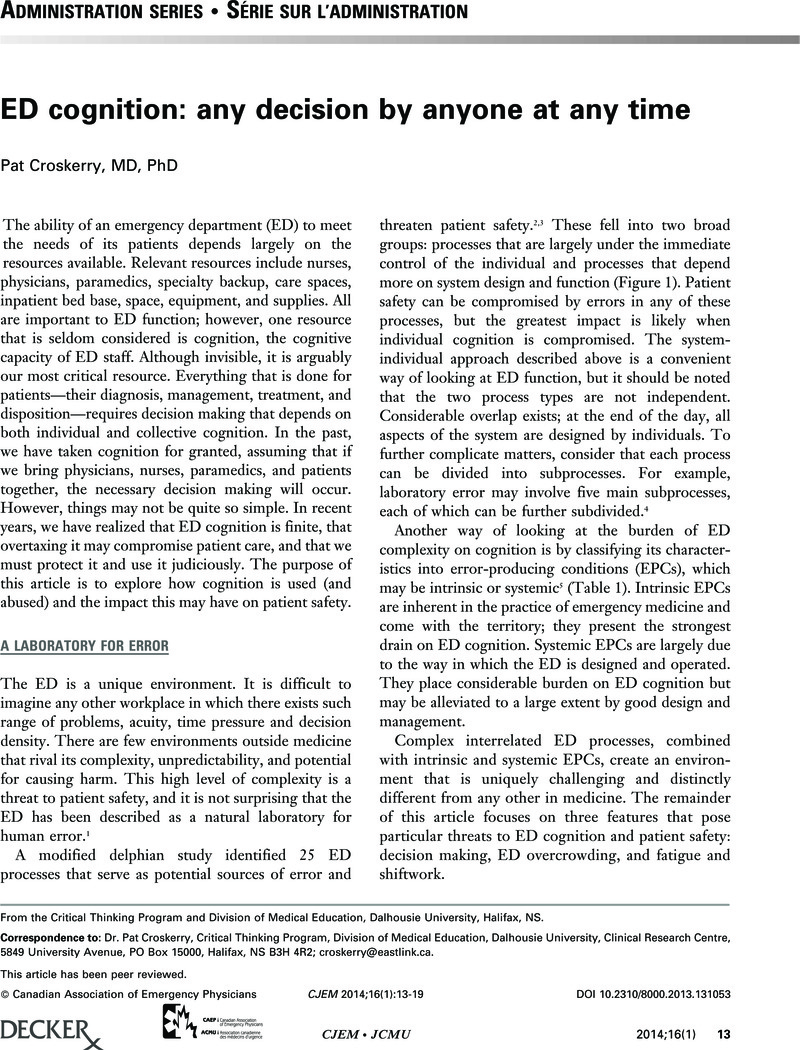Crossref Citations
This article has been cited by the following publications. This list is generated based on data provided by Crossref.
Croskerry, Pat
Singhal, Geeta
and
Mamede, Sílvia
2013.
Cognitive debiasing 2: impediments to and strategies for change.
BMJ Quality & Safety,
Vol. 22,
Issue. Suppl 2,
p.
ii65.
Croskerry, Pat
2015.
Pediatric and Congenital Cardiac Care.
p.
397.
O’Keeffe, Valerie Jean
Thompson, Kirrilly Rebecca
Tuckey, Michelle Rae
and
Blewett, Verna Lesley
2015.
Putting Safety in the Frame.
Global Qualitative Nursing Research,
Vol. 2,
Issue. ,
Elbarbary, Mahmoud
Hancock, Betty Jean
and
Morris, Melanie I.
2016.
Trauma Team Dynamics.
p.
133.
Wachs, Priscila
Saurin, Tarcisio Abreu
Righi, Angela Weber
and
Wears, Robert Lewis
2016.
Resilience skills as emergent phenomena: A study of emergency departments in Brazil and the United States.
Applied Ergonomics,
Vol. 56,
Issue. ,
p.
227.
Croskerry, Pat
2016.
Our better angels and black boxes.
Emergency Medicine Journal,
Vol. 33,
Issue. 4,
p.
242.
Pennaforte, Thomas
Moussa, Ahmed
Loye, Nathalie
Charlin, Bernard
and
Audétat, Marie-Claude
2016.
Exploring a New Simulation Approach to Improve Clinical Reasoning Teaching and Assessment: Randomized Trial Protocol.
JMIR Research Protocols,
Vol. 5,
Issue. 1,
p.
e26.
Chew, KS
Durning, SJ
and
van Merriënboer, JJ
2016.
Teaching metacognition in clinical decision-making using a novel mnemonic checklist: an exploratory study.
Singapore Medical Journal,
Vol. 57,
Issue. 12,
p.
694.
Schreiner, Ian
and
Bonadio, William
2017.
Disk Battery Ingestion in a Toddler: Less Than Meets the Eye.
The Journal of Emergency Medicine,
Vol. 52,
Issue. 6,
p.
863.
Oliver, Govind
Oliver, Gopal
and
Body, Rick
2017.
BET 2: Poor evidence on whether teaching cognitive debiasing, or cognitive forcing strategies, lead to a reduction in errors attributable to cognition in emergency medicine students or doctors.
Emergency Medicine Journal,
Vol. 34,
Issue. 8,
p.
553.
Zwaan, Laura
Monteiro, Sandra
Sherbino, Jonathan
Ilgen, Jonathan
Howey, Betty
and
Norman, Geoffrey
2017.
Is bias in the eye of the beholder? A vignette study to assess recognition of cognitive biases in clinical case workups.
BMJ Quality & Safety,
Vol. 26,
Issue. 2,
p.
104.
Chang, Bernard P.
Cain, Darnell
and
Mitroff, Stephen R.
2017.
Emergency department crowding associated with differences in CXR interpretations between emergency physicians and radiologists.
The American Journal of Emergency Medicine,
Vol. 35,
Issue. 5,
p.
793.
O'Sullivan, ED
and
Schofield, SJ
2018.
Cognitive Bias in Clinical Medicine.
Journal of the Royal College of Physicians of Edinburgh,
Vol. 48,
Issue. 3,
p.
225.
Seshia, Shashi S.
Bryan Young, G.
Makhinson, Michael
Smith, Preston A.
Stobart, Kent
and
Croskerry, Pat
2018.
Gating the holes in the Swiss cheese (part I): Expanding professor Reason's model for patient safety.
Journal of Evaluation in Clinical Practice,
Vol. 24,
Issue. 1,
p.
187.
Zavala, Alicia M.
Day, Gary E.
Plummer, David
and
Bamford-Wade, Anita
2018.
Decision-making under pressure: medical errors in uncertain and dynamic environments.
Australian Health Review,
Vol. 42,
Issue. 4,
p.
395.
Croskerry, Pat
2018.
Adaptive expertise in medical decision making.
Medical Teacher,
Vol. 40,
Issue. 8,
p.
803.
Rotella, Joe‐Anthony
2018.
Improved Assessment of Chest pain Trial (IMPACT): assessing patients with possible acute coronary syndrome.
Medical Journal of Australia,
Vol. 208,
Issue. 5,
p.
234.
Wright, Brad
Martin, Graham P.
Ahmed, Azeemuddin
Banerjee, Jay
Mason, Suzanne
and
Roland, Damian
2018.
How the Availability of Observation Status Affects Emergency Physician Decisionmaking.
Annals of Emergency Medicine,
Vol. 72,
Issue. 4,
p.
401.
Rotella, Joe‐Anthony
and
Yeoh, Michael
2018.
Taming the zebra: Unravelling the barriers to diagnosing aortic dissection.
Emergency Medicine Australasia,
Vol. 30,
Issue. 1,
p.
119.
Couto, Thomaz Bittencourt
Barreto, Joyce Kelly Silva
Marcon, Francielly Cesco
Mafra, Ana Carolina Cintra Nunes
and
Accorsi, Tarso Augusto Duenhas
2018.
Detecting latent safety threats in an interprofessional training that combines in situ simulation with task training in an emergency department.
Advances in Simulation,
Vol. 3,
Issue. 1,



